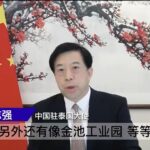This afternoon, the Constitutional Court of Thailand has issued a ruling on “National Budget Voting Proposal 2020 of Election Substitute Members” and did not judge that the 2020 budget proposal is invalid. All Thai people relieved and foreign investors have confidence that Thai economy has returned to its normal development path. Each country has its own guideline and process for economic development. In the current Thai economy, which industry will you invest in and make the most money?
We know that Chinese electric vehicle industry has achieved great leaps in development in recent years, more growth than Europe, America and Japan. Many foreigners living in Thailand for many years still wondering why both electric bicycles and electric cars are not popular in Thailand? Does Thailand’s tropical climate really limit its development? In fact, it’s not as you can see from the followings top 3 electric cars registered in Thailand in 2019:
No.1 MG ZS EV = 1,190,000 Baht
No.2 Nissan Leaf492 = 1,990,000 Baht
No. 3 Fomm = 599,900 Baht
From column chart of the total number of electric vehicles in the past 5 years: it increased from 76 registration in 2005 to 1,572 in 2019, particularly a huge number increasing from 2018 to 2019. Moreover, BYD E6 also tested in Thai taxi market for 2 years and Tesla model 3 has been welcome from buyers in Thailand as well. New EV Mini Cooper SE will enter to EV market in Thailand this year as well as Kia SOUL EV and Hyundai Kona Electric. Do you feel the industry development trend that is growing by leaps and bounds?
Electric vehicle industry in Thailand is growing. Before entering into Thai market, you need to know which incentive policy you can use in Electric Vehicle investment in Thailand?
According to BOI investment section, electric vehicle is in A2. Same example of operating in Borthong33 Industrial estate that grant incentives both tax and non-tax incentives as follows:
1) Tax Incentives: basic tax reduction incentive (exemption of corporate income tax for 8 years – not over than actual investment) + merit for competitiveness enhancement (reduction of corporate income tax for 1-3 years) + merit on decentralization (reduction of corporate income tax for 5 years) + merit on operating in Borthong33 Industrial Estate (tax incentive to grant 1 additional year of corporate income tax exemption)
2) Non-tax incentives: Permit to 100% own land, one stop service in industrial estate, permit to take out or remit money abroad in foreign currency, permit to bring into the Kingdom skilled workers and experts to work in investment promoted activities, double deduction from the costs of transportation, electricity and water supply, Additional 25 percent deduction of the cost of installation or construction of facilities, etc.
All incentive schemes will be considered and approved by BOI.
Thai automobile industry is one of the main industries of Thailand’s economy and leading export industry, approximately 2 million cars are produced annually: half of which are exported and half of which are sold domestically. Thai automobile industry not only consolidates the production bases of the world’s largest automobile companies but also has long established both the upper and middle of the complete downstream industrial chain, including manufacture of spare parts automobile assembly and sales. Although the automotive industry is the industry that Thai government does not focus much on supporting and most are still largely depend on the production of motorized vehicle which must be prepared for major upgrades and changes, electric vehicle industry also has high growth potential.
The crucial winter is over, spring has arrived, electric vehicles are waiting for you in Thailand!! I will wish that China to pass “winter epidemic” very soon! Go for it, China! Fighting Uhan!
Information and pictures are for reference only!
For more information on Thailand, please click:








